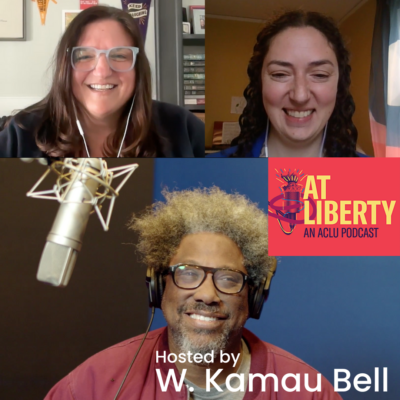At Liberty Podcast

At Liberty Podcast
Know Your Disability Rights with Zoe Brennan-Krohn and Nicole Jorwic
March 14, 2025
Seventeen. That’s the number of states suing the US government to end federal protections for disabled individuals. 880 billion. That’s the amount of money that Congress is primed to cut from Medicaid funding. One in four. That’s the number of adults in the US who report having a disability. The math, well—it isn’t adding up.
This week, W. Kamau Bell is joined by advocates Zoe Brennan-Krohn and Nicole Jorwic to discuss the current state of disability rights in the US, how we got here, and what a just, equitable system could look like—both for individuals needing care and their caregivers.
This Episode Covers the Following Issues
Related Content
- New YorkApr 2025

Disability Rights
Now-nyc V. Dod And Va. Explore Case.NOW-NYC v. DoD and VA
Status: Ongoing - Press ReleaseApr 2025

Disability Rights
Ny Court Of Appeals Grants Hearing To Father Challenging The Termination Of His Parental Rights Based On Disability And National Origin Discrimination. Explore Press Release.NY Court of Appeals Grants Hearing to Father Challenging the Termination of His Parental Rights Based on Disability and National Origin Discrimination
NEW YORK – Today, the New York Court of Appeals took a critical step toward remedying the injustice committed against Mr. Z, a father who was separated from his child at birth, by granting leave to appeal his case challenging the termination of his parental rights. This decision underscores the urgent need to address how race, national origin, language, and disability discrimination intersect within the family regulation system (also known as the child welfare system), particularly in cases where non-English speaking parents face communication barriers. “We applaud the decision of the Court of Appeals to hear Mr. Z’s case, which is a clear example of how disability and language discrimination work together to unjustly tear families apart,” said Aditi Fruitwala, senior staff attorney with the ACLU Center for Liberty. “Family court and family regulation agencies have a long history of assuming that people with disabilities and their partners are incapable of parenting, without making an individualized determination or providing accommodations to support their parenting. This is blatant disability discrimination.” Mr. Z’s case exposes serious systemic flaws in the family regulation system’s treatment of parents with disabilities and non-English speaking families. The New York City Administration for Children's Services (ACS) summarily concluded that Mr. Z’s wife was unable to care for their child due to her disability. Additionally, the ACS also concluded that Mr. Z was unable to care for their child due to his alleged lack of understanding of Mrs. Z’s disability. Family regulation agencies have an obligation to provide reasonable accommodations to disabled parents and their non-disabled spouses who are often swept into the family regulation system by association with someone with a disability. “Today marks an important step towards restoring Mr. Z’s parental rights, which the New York City Administration for Children's Services unlawfully took away,” said Beth Haroules, senior staff attorney at the New York Civil Liberties Union. “Parents with disabilities and their co-parents have a fundamental right to parent their children, and this right must be upheld. The Court of Appeals has a crucial opportunity to correct the harm done to this family and prevent similar injustices by ACS, an agency with a long history of targeting, and not supporting, vulnerable families.” “Mr. Z's native language of Fuzhou is one of the most commonly spoken Asian languages in New York City, distinct and mutually unintelligible from Mandarin, yet the agency initially saw fit to only provide a Mandarin interpreter instead,” said Charlie Jiang, Liman Law Fellow at the Asian American Legal Defense and Education Fund (AALDEF). “There is no excuse for the agency's unlawful failure to provide appropriate language interpretation for Mr. Z and his son. We urge the court to act swiftly to correct the agency's illegal and discriminatory practices, which will otherwise continue to harm immigrant families.” Though required by law, the family regulation authorities failed to provide Mr. Z with mandatory interpretation services throughout many stages of the family regulation process, including during visits with his son and meetings with the family regulation agency. Mr. Z and Mrs. Z speak Fuzhou and minimal Mandarin, but the foster agency placed their son in foster homes that only spoke English or Spanish, without offering their son any language classes in Fuzhou or Mandarin or culturally relevant programming, for the first seven years of his life. As their son grew older, Mr. and Mrs. Z found it increasingly challenging to communicate with him because of the language barrier. Nevertheless, Mr. and Mrs. Z continued to visit their son as frequently as possible, trying to share their food, language, and culture with their child. The American Civil Liberties Union, NYCLU, Asian American Legal Defense and Education Fund (AALDEF), Chinese-American Planning Council (CPC), and Lansner and Kubitschek filed amicus briefs addressing these systemic failures. The briefs emphasized that family regulation agencies must provide reasonable accommodations for parents with disabilities and their spouses and must not discriminate based on assumptions or stereotypes of people with disabilities. The briefs also highlighted the necessity of accurate translation, interpretation, and language access at every stage of the family regulation process. In Mr. Z’s case, neither was adequately provided — if at all. With leave to appeal granted, Mr. Z’s case will now proceed before the New York Court of Appeals. ACLU and NYCLU’s amicus brief is available online here. AALDEF, CPC, and Lansner and Kubitschek’s amicus brief is available online here.Affiliate: New York - News & CommentaryApr 2025

Disability Rights
I Should Not Have To Fight For Fair Treatment In The Workplace. Explore News & Commentary.I Should Not Have to Fight for Fair Treatment in the Workplace
D.K., a Pawnee woman who is Deaf, was denied a promotion after being assessed through biased automated hiring technology.By: D. K. - Press ReleaseMar 2025

Disability Rights
Racial Justice
Complaint Filed Against Intuit And Hirevue Over Biased Ai Hiring Technology That Works Worse For Deaf And Non-white Applicants. Explore Press Release.Complaint Filed Against Intuit and HireVue Over Biased AI Hiring Technology That Works Worse for Deaf and Non-White Applicants
DENVER – The American Civil Liberties Union, Public Justice, Eisenberg & Baum, LLP, and ACLU of Colorado filed a complaint with the Colorado Civil Rights Division and the Equal Employment Opportunity Commission (EEOC) against financial software company Intuit, and HireVue, a vendor of human resources assessment software using artificial intelligence (AI), on behalf of D.K., an Indigenous and Deaf woman, who was denied a promotion on the basis of her disability and her race. The complaint alleges that the companies violated the Colorado Anti-Discrimination Act (CADA), the Americans with Disabilities Act (ADA), and Title VII of the Civil Rights Act by using biased AI technology in hiring, resulting in systemic discrimination. D.K. is an Indigenous and Deaf woman, who is currently pursuing a master's degree in data science. She communicates using American Sign Language (ASL) and speaks English with a deaf accent. Since 2019, D.K. has held seasonal roles for Intuit, receiving positive supervisor feedback and bonuses every year. In the spring of 2024, D.K. was encouraged by her supervisor to apply for a seasonal manager position at Intuit, but was forced to use HireVue’s video interview platform, which features automated speech recognition systems to generate transcripts of applicants’ spoken responses from video interviews. These types of systems are known to perform worse for non-white and deaf or hard of hearing speakers who may have different speech patterns, word choices, and accents. D.K. requested and did not receive an accommodation. She was later rejected for the position and received feedback telling her to work on “effective communication,” to provide “concise and direct answers,” to adapt her “communication style to different audiences,” and to “practice active listening.” “My experience reflects the systemic discrimination built into AI-driven hiring tools that continue to exclude and disadvantage marginalized communities. Deaf individuals, Indigenous professionals, and countless others should not have to fight for fair treatment in the workplace, especially in an era where technology is shaping hiring decisions,” said D.K. “Companies like Intuit and HireVue must be held accountable for deploying flawed and exclusionary technology that creates artificial barriers for qualified candidates.” “Research shows that the type of technology underlying HireVue’s system is often unable to accurately recognize and analyze the speech of a deaf applicant, resulting in lower scores. The technology also struggles with non-white applicants, including Indigenous English speakers, whose speech patterns may differ from white applicants,” said Vedan Anthony-North, Marvin M. Karpatkin Fellow with the ACLU's Racial Justice Program. “Applicants should not lose critical job opportunities because of employment assessments that screen them out based on who they are and not whether they can do the job.” Intuit was aware of the limitations of automated speech recognition technology like the kind used by HireVue and its adverse impact on deaf employees. While D.K. had received high scores on performance measures during her time working at Intuit, she received artificially low scores on metrics stemming from automated speech recognition systems. However, rather than fix the problem, Intuit reassigned D.K. so that she no longer answered customer phone calls and instead only communicated with customers through a chat application, even though she had received positive feedback from customers who spoke to her on the phone. “Employers have a legal obligation to thoroughly vet any assessments they use to ensure that they are accessible and comply with anti-discrimination laws,” said Shelby Leighton, senior attorney with Public Justice. “Intuit knew HireVue’s technology was flawed and unfair to deaf applicants like D.K., which is a clear violation of discrimination laws.” “Companies cannot hide behind artificial intelligence to avoid responsibility for discrimination. Eisenberg & Baum is dedicated to challenging technologies that systematically marginalize Deaf, disabled, and Indigenous individuals. We will continue fighting to ensure AI-based hiring tools meet the highest standards of fairness and inclusivity,” said Andrew Rozynski and Sheryl Eisenberg Michalowski, co-directors of the Eisenberg & Baum Law Center for Deaf and Hard of Hearing, in a joint statement. “It is no surprise that artificial intelligence can deepen racial inequities and inequities for people with disabilities based on the way those programs are developed. The faulty technology at issue here is no exception,” said Tim Macdonald, ACLU of Colorado legal director. “As these tools and practices become more widespread, those that commission them must take great care to ensure that they treat all people fairly and do not exacerbate systemic biases in employment.” “Real change is necessary. Companies must stop using AI hiring tools that discriminate against disabled and non-white applicants, implement accessible and fair hiring practices, and ensure that all candidates are evaluated based on their skills, experience, and potential, not the biases baked into technology,” D.K. added. “Businesses are on notice that they are responsible for the discriminatory impact of hiring tools. It’s time for action, accountability, and justice.” A copy of the complaint can be found here.Affiliate: Colorado
0:00
/0:01
0:01